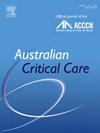重症监护室护士的工作-家庭冲突与护士评估的患者安全性有何关联?序列多重中介分析
IF 2.6
3区 医学
Q2 CRITICAL CARE MEDICINE
引用次数: 0
摘要
本文章由计算机程序翻译,如有差异,请以英文原文为准。
How is work–family conflict linked to nurse-assessed patient safety among intensive care unit nurses? A serial multiple mediation analysis
Aim
The aim of this study was to test whether rumination and negative affectivity mediate the relationship between work–family conflict and nurse-assessed patient safety among intensive care unit nurses.
Background
Most intensive care unit nurses experience work–family conflicts that jeopardise patient safety. Although prior studies have explored the effect of work–family conflict on patient safety, few have investigated whether work–family conflict is associated with patient safety through rumination and negative affectivity among intensive care unit nurses.
Design
Cross-sectional study.
Methods
This study included 209 intensive care unit nurses from five general hospitals. The Work–Family Conflict Scale, the Ruminative Response Scale, the Positive and Negative Affect Schedule-Negative Affectivity, and three items indicating nurses’ perception of overall patient safety were used to gather data. Associations between work–family conflict, rumination, negative affectivity, and nurse-assessed patient safety were assessed using correlation and serial multiple mediation analysis.
Results
Work–family conflict, rumination, negative affectivity, and nurse-assessed patient safety were significantly correlated (p < 0.01). Work–family conflict can have not only a direct negative impact on the nurse-assessed patient safety (effect = −0.0234; standard error [SE] = 0.0116; 95% confidence interval [CI]: lower limit [LL] = −0.0464, upper limit [UL] = −0.0005) but also an indirect impact on nurse-assessed patient safety through three paths: the independent mediating role of rumination (effect = −0.0118; SE = 0.0063; 95% CI: LL = −0.0251, UL = −0.0006), the independent mediating role of negative affectivity (effect = −0.0055; SE = 0.0039; 95% CI: LL = −0.0153, UL = −0.0001), and the chain-mediating role of rumination and negative affectivity (effect = −0.0078; SE = 0.0031; 95% CI: LL = −0.0152, UL = −0.0027).
Conclusion
Our findings indicated that work–family conflict could influence nurse-assessed patient safety through increasing rumination and negative affectivity among intensive care unit nurses. Based on the results, interventions aimed at decreasing work–family conflict would be beneficial for intensive care unit nurses’ emotional stability and patient safety.
求助全文
通过发布文献求助,成功后即可免费获取论文全文。
去求助
来源期刊

Australian Critical Care
NURSING-NURSING
CiteScore
4.90
自引率
9.10%
发文量
148
审稿时长
>12 weeks
期刊介绍:
Australian Critical Care is the official journal of the Australian College of Critical Care Nurses (ACCCN). It is a bi-monthly peer-reviewed journal, providing clinically relevant research, reviews and articles of interest to the critical care community. Australian Critical Care publishes peer-reviewed scholarly papers that report research findings, research-based reviews, discussion papers and commentaries which are of interest to an international readership of critical care practitioners, educators, administrators and researchers. Interprofessional articles are welcomed.
 求助内容:
求助内容: 应助结果提醒方式:
应助结果提醒方式:


